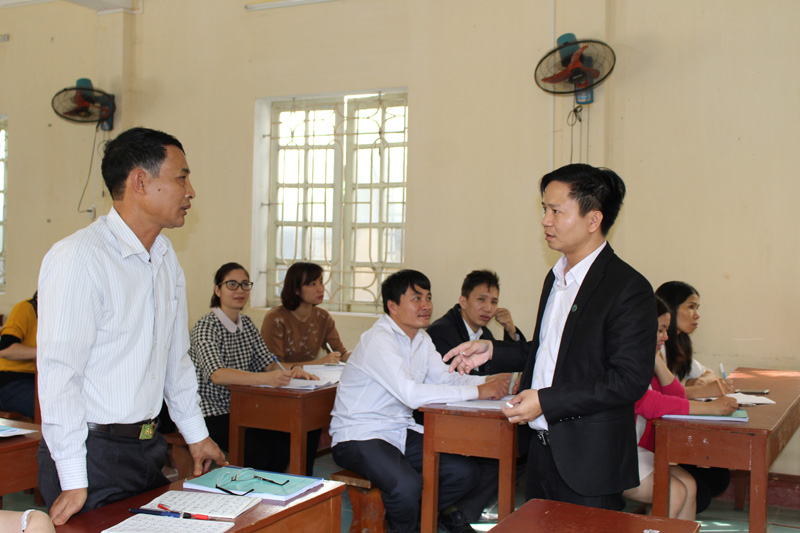
(HBO) - Based on the actual needs of many officials, staff, civil servants and armed force working in ethnic minority area without knowing their languages or understanding their cultural identities of Thai, Mong, Muong ethnics, the effectiveness of their work has been impacted a lot. Therefore, since 2010, the provincial center of continuing education officially opened training classes in Thai and Mong languages. After 7 years, the provincial center of continuing education has opened 19 training courses for about 1,243 learners. This makes an important contribution for the officials and staff to fulfill their tasks well in the ethnic minority areas.
To attract learners, the center has carried out many solutions, such as designing questionnaires and sending them to all the departments, boards and industries, or the media agencies to enroll. At present, the provincial center of continuing education has affiliates with the provincial police department, the department of domestic affairs to regularly open the courses of Thai, Mong language courses. In some districts, the center closely coordinated with the centers of continuing educations of Mai Chau, Da Bac, Lac Thuy districts to open the courses with the most suitable timetables and locations for the learners to join.
Teachers and learners practicing their communications in Thai language in one lesson of Thai language for the intake 16 at the provincial center of continuing education.
Mr. Le Ngoc Hop, the Deputy Head of Board of training and fostering for improving degrees in the provincial continuing education center said: To ensure the training quality, the center has recruited the ethnic minority teachers who have good qualifications, high pedagogy and a lot of experience of teaching. The teaching materials have been issued by the provincial People’s Committees; the syllabus had to be guided carefully by the provincial Department of Education and Training based on the curriculum of the ethic language teaching programme from the Ministry of Education and Training. The time limit for teaching Thai and Mong languages is usually 323 periods, the course includes two sessions: a session of learning the letters and spelling, then learning 9 topics (38 periods) and another session of revisions and getting the certificate (12 periods). At the end of each course, the center organizes for learners to have real practice in the ethnic minority areas of Thai or Mong people so that they can communicate, exchange the customs and culture with ethnic people.
In the school year of 2016-2017, the center has trained and given certificates for 7 courses with 462 learners. Since the beginning of this year, the provincial center of continuing education has opened 4 classes with 365 learners. Talking about the effectiveness of attending an ethnic minority class in the provincial center of continuing education, Mr. Ngo Minh Dan- Vice Head of Advisory Office (Provincial Police Department), the learner of intake 14 of Thai ethnic language, said: For my job requirements of collaborating regularly with the ethnic minority people, I have to understand their language and the cultural identities, I took a course of Thai minority language held by the provincial center. Since then, I have felt confident to communicate and exchange with Thai ethnic people so that I could successfully fulfill my assigned tasks of propaganda and mobilization of ethnic Thai people to strictly observe the law. In the near future, I will register for a Mong and Muong ethnic languages.
Living green is a healthy, positive, and sustainable lifestyle that not only helps protect
the environment and quality of life but also conserves natural resources and ecosystems.
Among the many ways to embrace this lifestyle, reducing plastic consumption is one of the most impactful.
The women's unions at all levels in Kim Boi district have been making significant contributions to the movement of building cultural life in the local community.
The movement helps improve rural look and the spiritual and material lives of local residents.
The Hoa Binh provincial People’s Committee has issued an action plan to ensure food safety, promote processing, and develop the market for agricultural, forestry, and fishery products in 2025.
In recent years, the development of rural handicrafts has not only helped preserve and promote the traditional values but it has also created jobs and improved incomes for the local residents.
By harmoniously combining traditional medicine with modern medical practices, the Hoa Binh Traditional Medicine Hospital is strengthening its role in the province’s healthcare system.



